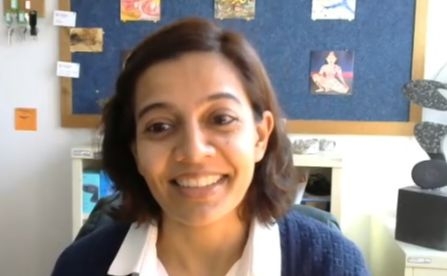News

SEVENTH RILEM YOUNG MEMBERS' INTERVIEW
Ms. Janina Kanjee is a Lecturer at the School of Civil and Environmental Engineering of the University of the Witwatersrand, Johannesburg, South Africa, as well as a PhD candidate. She joined RILEM in 2018, after being awarded the RILEM PhD grant at the 73rd RILEM Annual Week. She is currently a member of TC ARM: Alkali-aggregate reaction mitigation.
RIM: Thank you, Janina, for this interview and very nice to virtually meet you today.
Ms. J. Kanjee: Thank you for having me, Daniela.
RIM: I read from the RILEM database that you joined RILEM in 2018, that is the same year in which you received the RILEM PhD grant to travel to Delft, in the Netherlands, to attend the 73rd RILEM Annual Week. What about your relationship with RILEM before 2018?
Ms. J. Kanjee: I completed my Masters at the Concrete Materials and Structural Integrity Research Unit (CoMSIRU) at the University of Cape Town. I heard about RILEM back in 2011 but it was not really something I looked into at that point and got actively involved in. Once I finished my Masters, I worked as a structural engineer for four years. After this period, I decided that I wanted to pursue my PhD.
RIM: Where did you work as a structural engineer?
Ms. J. Kanjee: In Cape Town. It was great! I worked on several interesting projects, but I thought that doing a PhD was an opportunity that I could not let slip away, so I took a job in academia, in Johannesburg. I currently have a dual-position in which I am doing my PhD but I am also a member of Staff, thus requiring me to lecture as well.
At the beginning I felt so lost. I had lost touch with research developments as I had been in the design office and on-site for the four years. I was also very anxious as I started my PhD as I was much older than fellow scholars but at the same time it was also exciting. My colleague Mike Otieno encouraged me to present a paper at the 73rd RILEM Annual Week conference and subsequentially I also applied for the RILEM PhD grant… and it was a life-changing experience!
Attending that event was such a great opportunity for me, for several reasons. The first one was the doctoral course on microscopy offered prior to the conference. It was nice to visit such a well- established university with cutting-edge equipment and facilities. The course itself was well-run, as it was not only about knowledge transfer but was also hands-on (you had an opportunity of applying the skills gained). For me it was also important to network with all scholars present. I felt comfortable to be in the role of scholar again, not seen as a staff member.
The following week I had to present a paper at the Conference. I recall having not presented in such a long time and I was anxious. But at the end it was great opportunity and there were many lessons learnt that I take away from that conference. Furthermore, being able to sit next to people with different expertise, life values and experiences and have a conversation with them or a cup of tea! People are so humble! They are available to assist you, and advise you (“contact this person”, “try this method”). It was such a steppingstone for me as it opened my eyes to understand the values in being in such an organisation, the connectiveness between various stakeholders (academia, researchers, industry members) to address both local and global concerns. For young individuals, especially emerging researchers, this is very valuable. It helped me to understand my position in academia but also my contribution to society at large.
Lastly the RILEM PhD grant covered my travel, accommodation and conference registration fees. Typically for individuals like myself who reside in Africa, when considering the exchange rate it is expensive to travel to Europe. Without the grant, I could not have afforded that opportunity. I am truly indebted to RILEM for giving me such an opportunity and for encouraging individuals from all over the world to become part of the organization.
RIM: What happened afterwards? Have you continued to use that network of connections that you established in Delft in 2018?
Ms. J. Kanjee: It is so interesting as prior to my travels to Delft, I had spent some time at IIT-Madras in Chennai, India. And in Delft I met Prof. Gettu again! You really cannot quantify the impact of certain things, especially with respect to networking. You know? More than that, Delft was great because I managed to put faces into names. After Delft, Prof Alexander advised me to join a RILEM TC chaired by Prof. Esperanza Menendez Mendez (editor’s note, it is TC ARM: Alkali-aggregate reaction mitigation). Since I had seen and met Prof. Menendez in Delft, when she started this new TC, I felt confident to apply to become a member of this TC and I really looked forward to learning and contributing to the TC report.
We are so busy in our lives and being part of an organisation means additional commitments and we often say “no, I cannot give more of my time”. But if you find an organisation with values and a purpose that align with yours, it doesn’t feel like that. It becomes integrated with your work.
RIM: I know that you applied again for the grant this year as you were very eager to experience a RILEM Annual Week again. It is unfortunate that you didn’t receive it but I understand RILEM is currently discussing this scheme to make sure the grant is not a one-off opportunity but it gives some continuity to the awardees.
Ms. J. Kanjee: I really appreciate this. RILEM is fulfilling its commitment to give emerging researchers, who sometimes are not aware of the activities and values of organisations like RILEM a chance to see what it is all about.
RIM: As applicant of the 2021 RILEM PhD grant, you received a free registration to attend the 75th RILEM Annual Week online.
Ms. J. Kanjee: I was so fortunate because even though I was unsuccessful this round, RILEM (editor’s note, it was actually an initiative of the conference organisers who kindly waived the registration fees for all the applicants) gave us free registration to attend the event. Although I am not a big fan of virtual events, this will give me the opportunity to be a part of this great event! Many individuals residing in Africa are taking advantage of these online events to attend conferences that otherwise are unaffordable to attend in person. We miss traveling to a foreign country and the benefits of a gathering in person, but we are exposed to the technical content of an event and this is very important!
RIM: Where are you now with your PhD, Janina?
Editor’s note: the best way to facilitate Ms. Kanjee’s reply to my question is posting the image of Janina's faces:

RIM: When you work and do your PhD at the same time, it is so hard! And if that work is teaching, I think it is even harder. Teaching was not the favourite part of my job when I was in academia. It takes a huge amount of time and effort to do a good job! There are only 24 hours in a day. Is it the same for you?
Ms. J. Kanjee: You literally took the words out of my mouth! Since I came from industry, I found these two environments, teaching and industry so different! I struggled to teach and work on my PhD in the beginning. I am very fortunate that my Head of School and my colleagues are aware of my situation and they are very mindful about my teaching load. Now I am actively trying to put more focus on my PhD. I am in the experimental stage. It is not going as fast as I initially intended, but at least it is going!
RIM: I have two more questions for you related to RILEM and Africa. The first one is “how is it to be a PhD student in Africa?” and the second is “what do you think associations like RILEM can do for young researchers like yourself in this part of the world?”
Ms. J. Kanjee: I think it is great that RILEM is putting emphasis on the research carried out in Africa, like for instance, the establishment of a TC on agro-based materials (editor’s note, TC 291-AMC: Use of Agro-Based Materials as Cementitious Additions in Concrete and Cement-Based Materials). RILEM has a big role in guiding practitioners and researchers in the use of new construction materials or making provisions for newly built structures. In Africa we are dealing with rapidly growing population. It crucial that we use our resources efficiently and sustainably. Furthermore, one of the things that I noticed is that often in African countries we adopt standards and practices from more developed countries. I think it is important that we understand the underpinning theory but make provisions for the local context and environment.
I do think that we as Africans, need to take this opportunity to RILEM and say “Ok, this is what we are doing, how we are doing it. How can we collaborate? Shall we start a new TC?”. It takes two to tango! We should in essence be louder and showcase our research; and be more proactive and less reactive.
RIM: What do you think about the current RILEM Young Membership scheme? Are the fees (Editor’s note: 10 euro/year for the majority of African countries enjoying the 60% discount) reasonable for a young researcher/PhD student in Africa?
Ms. J. Kanjee: I do think it is still high. Students are faced with quite challenging circumstances; increasing cost of tertiary education, accommodation and COVID-19 has just compounded the situation. Joining an organisation for 10 euro/year could be the last thing you are going to put money towards.
RIM: … and despite the amazing work of the RILEM Youth Council and the RILEM Regional Convener for Subsaharan Africa we do not see skyrocketing numbers of members joining from that part of the world.
Ms. J. Kanjee: I do think that students need to ask for assistance from their faculty. Often students give up straight away if they do not have funding. In my case, if I do not have funding and I really want to be a part of an initiative, I go to Prof. Ballim (editor’s note, Professor Yunus Ballim, University of the Witwatersrand) and say “I need help”. I also think it is important that RILEM members showcase the values and activities of RILEM to encourage young students to join in.
RIM: Janina, it has been an immense pleasure to interview you today. Thank you so much! And fantastic to meet you!
Ms. J. Kanjee: Likewise! Thank you and bye!














No comment
Log in to post comment. Log in.